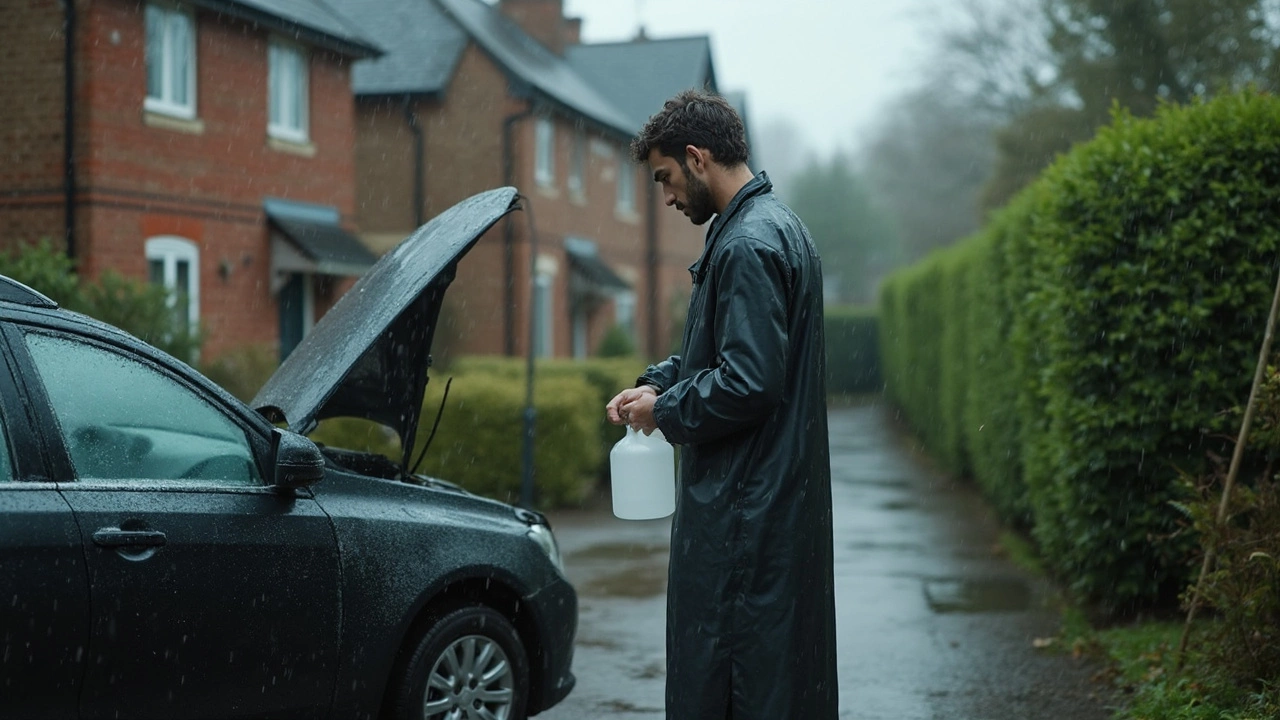Ever looked at your empty windshield washer reservoir and wondered if you could just fill it up with water from the tap? Maybe you've run out of washer fluid and don't want another trip to the store. It sounds easy, but there’s a catch—or a few. Sure, water is cheap and always on hand, but it’s missing some key ingredients that keep your windshield clear and your car’s system working right.
The stuff you buy as windshield washer fluid isn’t just blue water. It usually contains cleaning agents that cut through bugs, dirt, and greasy road film way better than water alone. Plus, there are chemicals in washer fluid that keep it from freezing in winter and help prevent the lines in your car from clogging up. If you just use water, you may save a couple bucks now, but the crud left on your windshield—and possible damage to your washer system—can cost a lot more down the road.
- Water vs. Washer Fluid: What’s the Real Difference?
- What Actually Happens if You Use Water?
- Risks You Probably Didn’t Think About
- Better Solutions and DIY Options
- Tips for Year-Round Windshield Care
Water vs. Washer Fluid: What’s the Real Difference?
The idea of swapping out washer fluid for plain water comes up a lot, especially when people are in a hurry or looking to save a few bucks. But here’s the bottom line: they’re not the same thing, and the difference matters, especially for your windshield wiper system and overall visibility.
Washer fluid is designed for cars. It’s got detergents that break down oily stuff, like bug guts and traffic grime, much better than water ever could. Most brands also add alcohol or other chemicals that keep the fluid from freezing, which is a big deal if you live anywhere that gets cold. Water, on the other hand, freezes solid around 0°C (32°F), which could crack your reservoir and lines if winter hits.
| Feature | Water | Windshield Washer Fluid |
|---|---|---|
| Main purpose | Rinsing | Cleaning & protection |
| Cleans oily grime | Poor | Excellent |
| Prevents freezing | No | Yes |
| Removes bugs & dirt | Partially | Effectively |
| Protects washer system | No | Yes |
| Leaves residue | Often | Rarely |
With plain water, you get streaks, spots, and sometimes stubborn grime just floats around instead of disappearing. Worse, tap water can leave mineral deposits, eventually clogging the nozzles or the pump. On the flip side, commercial washer fluids keep stuff moving, help your blades do their job, and can even offer some anti-corrosion benefits for the entire washer system.
If you live somewhere rainy and mild, water might seem to get by for a bit, but you’ll definitely see your visibility take a hit when you run into messy roads—or the next bug hurricane. Washer fluid’s extra cleaning power and protection just makes life a lot easier, especially when you need your windshield crystal clear in a hurry.
What Actually Happens if You Use Water?
Topping up your washer reservoir with just water seems harmless, but there are a few real issues that pop up faster than you’d think. First off, water just doesn’t cut it when it comes to cleaning power. It moves some dirt off the glass but struggles with oily gunk, dead bugs, or road grime. Most of the time, your windshield just ends up streaky, which can mess with your visibility—especially when you’re driving straight into the sun.
Temperature swings can catch you out, too. In colder months, plain water freezes easily. When it does, you’re not just staring through a dirty windshield; you could end up with cracked washer lines, busted pumps, or a damaged reservoir. It’s hard to overstate how annoying—and expensive—those repairs can get.
Another thing folks don’t always think about: water isn’t treated for bacteria or algae. Over time, that means your washer tank can turn into a science project. Open the hood and you might get hit with a funky smell coming from the vents when you spray. Not a great start to any drive.
Here’s what you can actually expect if you use water instead of windshield wiper fluid:
- Poor cleaning, especially if you get tree sap, bug splatter, or winter salt on your windshield.
- Risk of the water freezing in the tank or hoses during chilly weather.
- Potential long-term damage to the washer system from minerals and bacteria buildup.
- Musty smells and sometimes even green or brown gunk inside the reservoir.
So, while water might work in a pinch during summer, it’s only buying you time. You'll want to switch back to proper washer fluid as soon as you can if you want a clear, safe view of the road.

Risks You Probably Didn’t Think About
On the surface, using plain water in your windshield washer seems harmless. But there’s a lot more going on under the hood. Skipping actual washer fluid can mess up your car in ways you might not expect—sometimes fast, sometimes slowly over months.
Here’s where things usually go wrong:
- Water can legit freeze in your washer fluid tank and lines if temperatures dip below 32°F (0°C). Regular washer fluid is mixed with alcohols (like methanol or ethanol), dropping the freezing point way lower—down to -20°F (-29°C) or even less for winter blends. A tank full of frozen water could crack or burst, leaving you with a pricey repair.
- Mold, algae, and bacteria love to set up shop in stagnant, untreated water—especially in the summer. You’ll sometimes notice a musty odor spraying onto your glass, or even get slime clogging your washer nozzles.
- Water’s not designed to clean oils and stuck-on bugs. By skipping proper cleaner, your visibility takes a hit, especially during pollen-heavy spring days or after summer road trips.
- Unfiltered tap water can contain minerals that build up in your washer jets and pump. This leaves stubborn deposits and eventually, your washers could stop working altogether.
It’s not just theory either. Here’s a quick look at what car owners and mechanics see most with water-only washer tanks:
| Problem | How Often It Happens (Percent of reported cases) | Repair Cost (USD) |
|---|---|---|
| Frozen tank/lines | 30% | $80-200 |
| Mold/algae smells | 40% | $10-50 (cleaning, flush) |
| Blocked washer nozzles | 20% | $30-75 |
| Mineral buildup in pump | 10% | $100-300 |
Not to mention, many cars now have sensors to check washer fluid level. Some of these sensors can fail after getting gunked up with hard water or goo, which is another headache you don’t want.
Better Solutions and DIY Options
If you’ve run out of real washer fluid, there are smarter moves than just grabbing water. Some drivers swear by mixing up their own basic washer fluid at home, and yeah, it can save you money if you do it right. The main thing is: your mix needs to clean your windshield, stop bacteria growth, and stay liquid when it gets cold. Topping off with plain water only works in a pinch—and only in mild weather. But even then, expect streaks or, worse, a gunky mess in your washer lines.
For a simple homemade windshield washer alternative, just mix:
- 1 part distilled water (not straight from the tap, since tap water can cause mineral buildup)
- 1 part white vinegar (good for killing bacteria and cutting through grime, but avoid vinegar if your area regularly drops below freezing since it can freeze up too)
If it’s winter, swap the vinegar for isopropyl alcohol (rubbing alcohol). Try 2 parts distilled water to 1 part 70% rubbing alcohol. This blend can keep your lines from freezing up unless you’re somewhere it gets super cold, then bump up the alcohol ratio.
Want to skip the DIY hassle? Look for commercial washer fluids labeled "all-season" or "de-icer." They’ll give you the right cleaning power and freeze protection, no guesswork needed. Just steer clear of household soap, dish detergent, or ammonia—these might mess up your car’s paint, strip wax, or eat away at rubber seals.
So if you want the best for your windshield wiper system, stick to dedicated washer fluid or a tried-and-tested DIY recipe. Your view—and your car—will thank you for it.

Tips for Year-Round Windshield Care
Keeping your windshield clean and streak-free isn’t just about looks—it’s about staying safe while driving. Little things like dirt, bugs, and streaks can block your view. Here’s what you should actually do to keep things clear all year.
First off, always use proper windshield wiper fluid. It’s designed to break down grime and won’t freeze in winter. Water doesn’t cut it when there’s a hard freeze or stubborn bug splatter. In cold months, go for washer fluid labeled "de-icer"—that stuff can handle subzero temps thanks to a higher alcohol content.
Change your wiper blades every 6 to 12 months. Even the best fluid is useless if your blades are cracked and squeaky. If you notice streaks or hear squeaking, it’s time for new ones.
- Top up washer fluid before road trips: Don’t wait till it’s empty.
- Clean wiper blades regularly: Just run a damp cloth along the blade to clear off grit.
- Check nozzles for blockages: Use a safety pin to clear tiny clogs if the spray seems weak or uneven.
- Don’t mix types of washer fluid: Mixing summer bug-remover fluids with winter de-icers can gum up the system.
- Never use household cleaners: Some contain ammonia, which beats up plastic and rubber over time.
Here's a quick comparison between common windshield washer solutions and water:
| Solution Type | Freezing Point | Cleaning Ability | System Protection |
|---|---|---|---|
| Standard Washer Fluid | -20°C (-4°F) | High | Yes |
| De-Icer Washer Fluid | -40°C (-40°F) | High | Yes |
| Tap Water | 0°C (32°F) | Low | No |
| Distilled Water | 0°C (32°F) | Low | No |
Avoid letting your washer reservoir run dry. Running the system with no fluid can overheat the tiny pump and break it. Lastly, don’t forget to clean the inside of your windshield—gunk on the inside can glare at night just as much as bird droppings on the outside.

